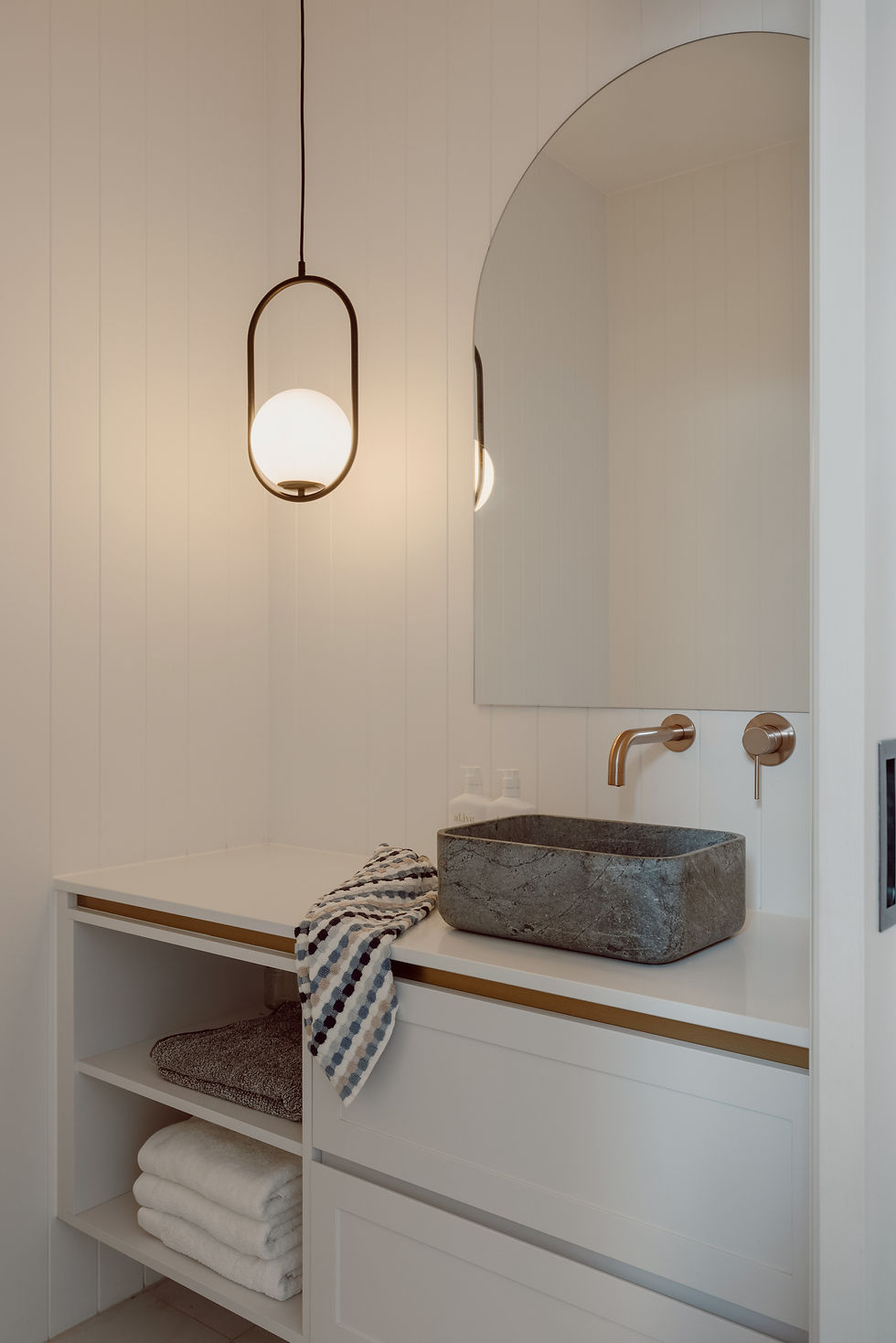A quick guide to healthy and sustainable benchtop options for your next renovation
- Nina Di Marco

- May 26, 2025
- 3 min read
Choosing the right benchtop is an important part of a new build or renovation. The surface you prep food on every day should not only be durable and stylish, but also kind to your health and the planet. With so many materials available it can be hard to know which one will truly support your lifestyle, values, and wellbeing. In this post, we’ll walk you through some of the most popular benchtop options in Australia and take a closer look at how each performs.
Laminate
Laminate is cheap and easy to install, making it a very popular product for those on a tight budget. Like laminate cabinetry, laminate benchtops are a printed sheet bonded onto a substrate. It's important to ensure the substrate has E0/E1 formaldehyde levels to ensure it does not off-gas VOC's over time. Luckily, both Polytec and Laminex have E0/E1 formaldehyde laminates. Both of these companies also have factories Australia, reducing transport emissions. Whilst laminate is fairly durable, it can scratch and scorch and it cannot be resurfaced or fixed. This means it tends of have a shorter lifespan, and usually cannot be recycled either.
Solid Timber
Timber is a great product for benchtops due to it's ability to be sanded back and refinished many times as needed. It is also an environmentally friendly option, as long as it is locally sourced and from a FSC, PEFC or AFS accredited forest. It will need to be finished with a food safe oil to protect it as much as possible from scratches. Ensure to select a natural or low-VOC sealant to avoid any off-gassing.

Mineral Surfaces (Silica-free Reconstituted Stone)
Reconstituted stone has always been one of the most popular benchtop products due to it's great qualities - being highly resistant to stains and scratches. The crystalline silica content was a huge concern, but most companies now have new mineral surfaces ranges which are silica-free. These are also often now made from high amounts of recycled materials such as glass. However, it's important to note that they cannot be recycled again, meaning it will end up in landfill at the end of its lifespan.
Natural Stone
Natural Stone is a lovely luxurious product for benchtops, with many different colours, patterns, and qualities available. Whilst all stones will be durable after a sealant is applied, softer options like travertine, limestone and marble will need more maintenance. On the other hand, dolomite, quartzite and granite are much more durable and require less maintenance. When selecting a sealant, it's important to ensure a low VOC option is used to ensure the best air quality. Natural stone can be resealed and repaired as many times as needed, giving it a very long lifespan.
Porcelain panels
Porcelain is incredibly strong, durable, non-porous and is scratch, heat and moisture resistant, which allows it to have a long lifespan even though they cannot be refinished or repaired. Porcelain panels are made from natural raw materials like clay, quartz, and feldspar, and are also VOC free and recyclable, making it a healthy and sustainable option for the home.

Sintered Stone
Sintered stone is similar to porcelain in that they are both made using natural raw materials and are made in a similar high-heat, high-pressure process. However, while porcelain panels were original designed as an alternative for tiles, sintered stone was designed specifically for benchtops. Like porcelain, sintered stone is incredibly strong, durable, non-porous and is scratch, heat and moisture resistant. However, whereas porcelain panels are usually 12mm thick and can only be finished in a square edge, sintered stone comes in a standard 20mm thickness allowing for more possibilities for the edges.
Solid Surface
Solid surface is an acrylic resin with a filler of alumina. Because of the acrylic resins used, some solid surface benchtops may off-gas VOCs. However, solid surface benchtops are also non-porous, hard-wearing, easy to clean, and it's easy to repair chips and scorching. This gives them a long lifespan, however, keep in mind they cannot be recycled at the end of their life.
There’s no one-size-fits-all solution—every surface has its pros and cons—but when you know what to look for, you can make a decision that’s right for your lifestyle, your renovation goals, and the planet. And if you ever feel overwhelmed with all the options, we’re here to help you navigate it with ease, honesty and a little bit of fun.
Thank you for taking the time to read our blog post. Have a wonderful week!
Nina xx




Comments